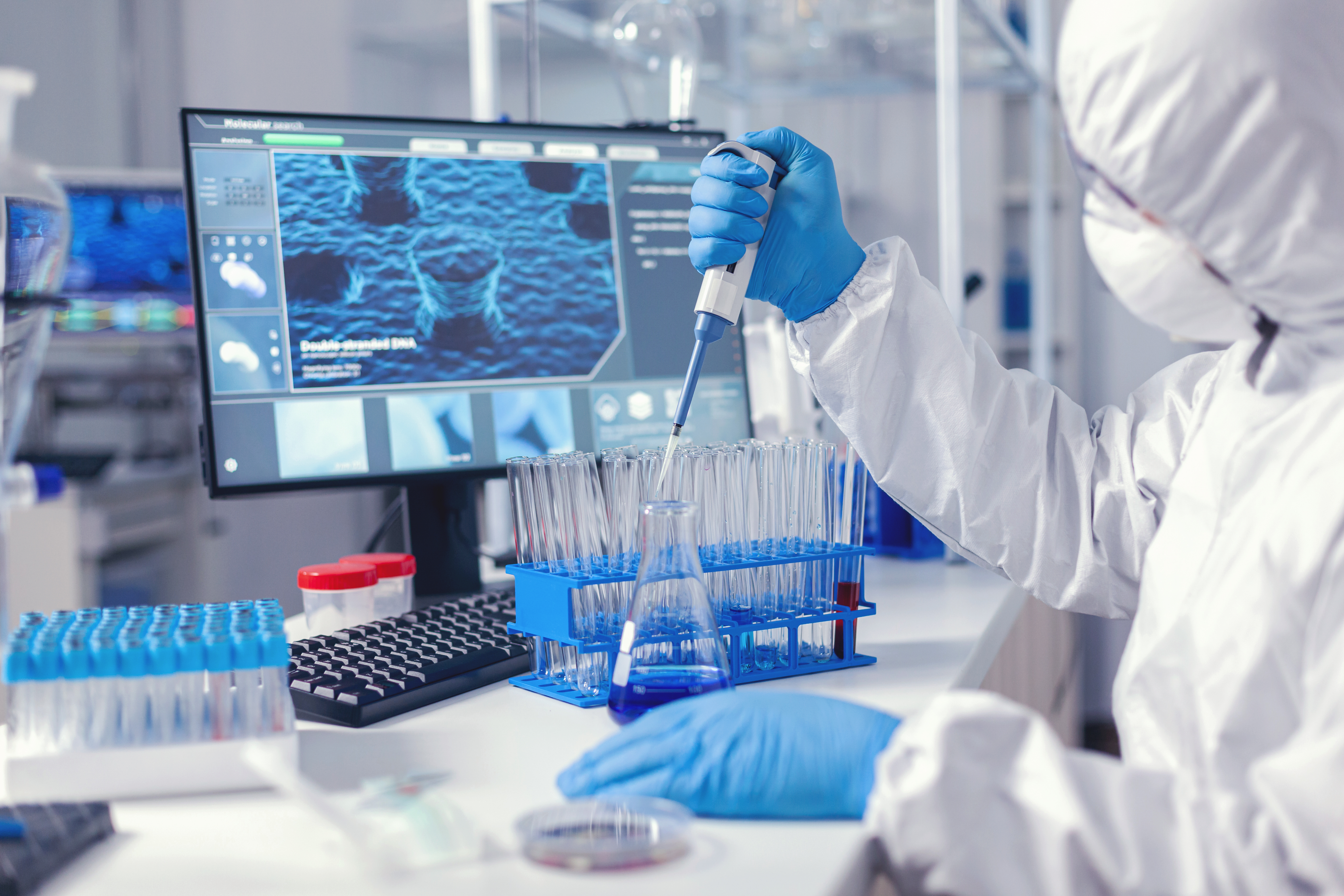Topics covered
- 5 min
- Published: 10 June 2025
- Updated: 10 June 2025
If you're interested in health or medicine, you may have come across biomedical science as a potential study option. Biomedical science is a field that combines biology and medical principles to understand and solve various health-related problems. This area of study will give you a deep understanding of the human body's biological processes and the diseases that can affect it.
The main focus of biomedical studies is theoretical learning, scientific research, and laboratory practice. You'll also learn how to apply scientific principles in the context of human health care and improvement.
Due to its broad scope, biomedical science offers a wide range of career opportunities. Whether you focus on biomedical science or biomedical engineering, both open up many pathways in health and research fields. Moreover, the demand for health professionals—both in Indonesia and globally—continues to rise year after year.
To determine whether biomedical science is the right path for you, let’s take a deeper look at what biomedical science is, the different types of programs available, and the career prospects it offers.
What is biomedical science?
Biomedical science is a field that applies principles from biology, medicine, and in some cases, physics. Specifically, it’s the study of biological phenomena in living organisms related to disease—ranging from causes and prevention to treatment and recovery.
Biomedical science encompasses a variety of disciplines, including anatomy, physiology, pharmacology, genetics, pathology, and more. By studying various aspects of the human body and health, biomedical scientists can better understand how to maintain wellbeing and develop more effective treatment approaches.
Research in biomedical science has led to major breakthroughs, including the development of new drugs and therapies, identification of disease risk factors, and the creation of innovative medical devices and diagnostic tools.
Unlike other health-related fields, the main focus of biomedical science is on the biological and physiological aspects of health and disease, aiming to develop new treatments and medical technologies. In comparison, medicine is more focused on the direct diagnosis, treatment, and prevention of disease in patients, involving clinical training. Health science, meanwhile, takes a broader view, covering healthcare systems, public health, and disease prevention at a population level.
Join the IDP student community
Connect with peers and student ambassadors to hear real experiences, tips, and advice about studying abroad.

What is biomedical engineering?
Aside from biomedical science, there’s also biomedical engineering, which has a different focus. Biomedical engineering is a branch of science that applies engineering principles to human biology, healthcare, and medicine to develop technological solutions in the medical field.
Unlike biomedical science, which leans more towards basic research, biomedical engineering focuses on the development and application of technology. It combines biology, physics, and engineering to create tools, procedures, and systems that support diagnosis, treatment, and patient recovery. Examples of medical devices developed in this field include pacemakers, prosthetics, and assistive devices designed to help patients lead more functional lives.
One example of innovation from biomedical engineering is MRI (Magnetic Resonance Imaging) technology, which allows for detailed imaging of organs without surgery. This field also contributes to the development of medical information systems, patient monitoring devices, and other advanced technologies aimed at improving patient care and the efficiency of healthcare services.
Biomedical courses in Indonesia and universities abroad
Biomedical science is a study area that covers key health-related topics, making it an ideal choice if you want to understand the connection between science and human health. Its wide scope allows students to choose subjects aligned with their interests and career goals.
Some common subjects studied in biomedical science include:
Anatomy (study of body structures)
Physiology (functions of organs and body systems)
Pharmacology (how drugs work in the body)
Genetics (role of genes in health and disease)
Immunology (the immune system and its defence against infection)
Microbiology (study of microorganisms like bacteria and viruses)
Pathology (study of the causes and effects of disease)
With the increasing demand for healthcare professionals, many universities—both in Indonesia and abroad—offer programs in this field, particularly in biomedical science.
Biomedical courses at Indonesian universities
In Indonesia, there is still high demand for medical professionals and health researchers. To meet this demand, several leading universities have established and expanded biomedical science programs as part of their contribution to the health sector.
Some Indonesian universities that offer biomedical science courses include:
Universitas Indonesia (UI)
Universitas Gadjah Mada (UGM)
Universitas Airlangga (UNAIR)
Institut Teknologi Sepuluh Nopember (ITS)
Institut Teknologi Bandung (ITB)
Biomedical courses at international universities
Many international universities also offer biomedical science programs. Studying biomedical science abroad provides added benefits, such as access to advanced research facilities, international collaboration, and wider career opportunities with a globally recognised qualification.
Some internationally renowned universities offering biomedical science include:
University of Melbourne, Australia
University of Sydney, Australia
Monash University, Australia
Imperial College London, UK
University of Edinburgh, UK
University of Manchester, UK
University of Toronto, Canada
University College Dublin (UCD), Ireland
Studying biomedical science abroad offers a comprehensive learning experience while helping you build a global network. You’ll benefit from an advanced education system, cutting-edge research facilities, and a curriculum focused on both practical learning and research.
To simplify your study journey abroad, IDP can support you throughout the process—from preparation to departure. Whether you're aiming to study in Australia or the UK, you'll get help with university applications, course selection, and preparing study and visa documents.
Biomedical science vs medicine
Now, you may have a clearer understanding of what biomedical science is. But still, many people wonder: how does it differ from medicine?
In general, biomedical science is a branch of health science that focuses on understanding the human body, diseases, and the development of medical technologies and treatments. However, unlike medicine, biomedical science does not aim to train graduates to become doctors or clinical practitioners.
This course is better suited to those who want to contribute to healthcare without being directly involved in clinical practice, such as patient care. Graduates often work in medical research, laboratory science, drug and device development, or in pharmaceutical or biotech industries.
In other words, if you're fascinated by the scientific side of healthcare—such as researching the causes of disease, developing vaccines, or creating new medical devices—then biomedical science could be the right course for you.
Career prospect for biomedical science graduates
With its broad and multidisciplinary scope, biomedical science graduates enjoy diverse career opportunities beyond just the healthcare field. You could work as a researcher, forensic expert, lab analyst, or medical technology developer. Graduates are also in demand at testing centres, clinical labs, research institutions, hospitals, and health regulatory bodies. In the pharmaceutical industry, you might work as a clinical trial specialist, drug developer, or health product safety analyst. With ongoing advancements in technology, digital health and hospital innovations continue to grow. This has increased the demand for biomedical science graduates in roles such as:
Medical data analyst: using big data to predict health trends and treatment effectiveness
Medical device specialist: developing and assessing tools like MRI machines, prosthetics, and patient monitoring tech
Quality assurance & regulatory affairs: ensuring medical and pharmaceutical products meet safety standards
Health tech specialist: working with health tech startups to build digital solutions like health monitoring apps, AI diagnostics, or wearable devices
Biomedical science graduates also have the opportunity to pursue further studies or specialise in areas like genetics, biotechnology, or biomedical engineering—all of which are highly in demand in today’s modern health sector.
Why study biomedical science?
Aside from a passion for health and research, you may be looking for stronger reasons to choose a biomedical science degree.
Biomedical science combines science and technology, making it a promising field for the future. You’ll study the complex systems of the human body and learn how scientific principles can be used to solve today’s health challenges.
Through this study, you’ll play a key role in health innovation—from developing medical technologies and diagnostic tools to researching diseases and their treatments. This is why biomedical science graduates are so highly sought after in today’s era of medical advancement.
The course will also equip you with scientific skills such as research, lab techniques, and experimental design. Additionally, you’ll develop transferable skills useful across many industries, including analytical thinking, communication, problem solving, numeracy, and IT proficiency—skills that are in high demand in many sectors.
Study your dream course abroad
With all the advantages offered by biomedical programs—whether it’s biomedical science or biomedical engineering—are you confident in your study choice?
Biomedical studies open up promising opportunities. From mastering technical skills to enjoying a wide range of career prospects, you’ll have plenty of chances to grow both academically and professionally, whether in your home country or internationally.
Interested in studying biomedical science or engineering and looking for the right university abroad to match your goals?
Talk to IDP about your study plans! Our experienced counsellors are ready to support you every step of the way—from choosing the right university, preparing documents, and applying, to settling into your new home abroad.
Book your free counselling session today and take the first step towards studying overseas with IDP!
One account for all your study abroad needs
Create your profile and unlock a wide array of features including personalised recommendations, fast-tracked applications and much more.











